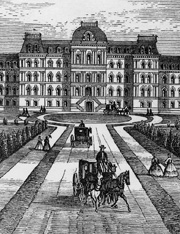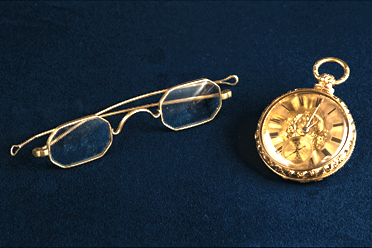Preface
By Ronald D. Patkus, Associate Director of the Libraries for Special Collections
Multimedia features

Listen to readings from some of the earliest letters written at Vassar:
The 150th anniversary of Vassar College provides an opportunity for members of the college community and others to reflect on the past and its connections to the present and the future. The process of reflecting—and celebrating—will of course take place in a variety of ways throughout the year. A number of events are happening on campus. Lectures sponsored by academic departments and multidisciplinary programs will be given; commissioned works of dance, theater, music and poetry will be performed; and a special course relating to the early history of the college will be offered. Off campus, several American and European cities will serve as sites for gatherings of alumnae/i and friends.
The Vassar Library is contributing to the sesquicentennial celebrations primarily through the mounting of several exhibitions and related programming. The first exhibition, on display during the spring of 2011, is "The Most Perfect Education of Body, Mind and Heart": Vassar and the Liberal Arts. The title comes from a phrase used by Matthew Vassar in a speech to the Board of Trustees in February of 1861; it summed up the goal he and his colleagues had for the new school in Poughkeepsie. Drawing on archival materials and featuring a multi-media display, the exhibition focuses on the college's earliest years, though several themes—such as the college's mission, the curriculum, and social issues—are followed through to the present. There is also a common thread, as indicated by the subtitle, and that is Vassar College's interaction with the idea of liberal education. At several points in the exhibition one views items from the college archives that invite people to think about the ways in which members of the Vassar community have interpreted the liberal arts at particular times. Has Vassar proceeded in ways that are similar to, or different from, other experiments in the liberal arts? Has Vassar's approach resulted in any special contributions to liberal arts education in the United States? Investigation of questions like these seems particularly relevant for an institution that has long been regarded as one of the premier liberal arts colleges in the United States. Along the way, we see the origin and development of some of Vassar's principal educational values, such as innovation, excellence, and diversity.
This catalogue serves as a print complement to the exhibition. Its contents provide expansive considerations of Vassar and the liberal arts. In the "Introduction and Guide to the Exhibition," Special Collections Librarian Laura Finkel, who was responsible for the thematic conception and curation of the exhibition, provides a narrative description of topics that are considered in the exhibition, and points out some of the specific materials that appear in the cases. The first long essay, by Professor of History Rebecca Edwards, provides context for the early years of Vassar's history by discussing the rise of women's academies and colleges in America and abroad. Her study is especially noteworthy for its argument that education played a significant role in the early development of women's rights. The second long essay, by Dean of Planning and Academic Affairs and Professor of Classics Rachel Kitzinger, discusses liberal arts education and its roots in antiquity.
Besides the essays, the catalogue includes other useful pieces. There are a number of photographs of exhibition items, thus giving a visual sense of archival documents and artifacts in our collection. And the publication includes the text of Matthew Vassar's February 1861 statement to the Board of Trustees. This remarkable document bears re-printing, since in it we see the founder's broad vision for the institution that would bear his name. As with other items in the exhibition, it allows us to see a history to certain educational values long held by the college.
In this sesquicentennial year, I hope we will all benefit from seeing the exhibition, reading this catalogue, visiting the website, and reflecting on key aspects of Vassar's long and extraordinary history.

Matthew Vassar's eye glasses and pocket watch.
The Most Perfect Education of Body, Mind, and Heart will be on display from January to June 2011 in the Vassar College Main Library.